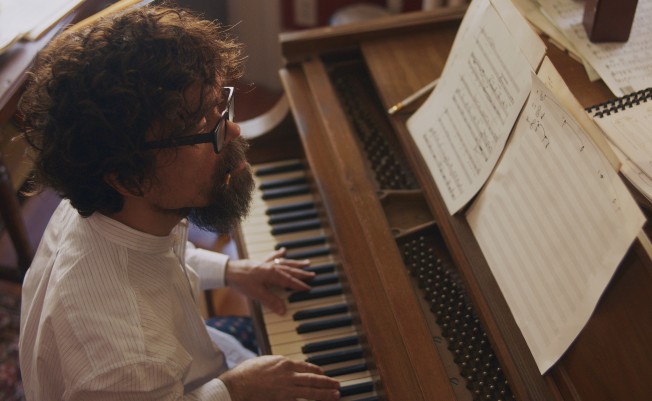Cinematographer Sam Levy was immediately drawn to She Came to Me (Vertical Entertainment). He loved the script. But beyond that, he became enamored with two prime opportunities the feature film presented–being able to not only reunite with writer-director Rebecca Miller but also to try his hand at staging, lighting and lensing a couple of operas within the context of the story.
On the former score, Levy some eight years ago shot Maggie’s Plan, a feature helmed and co-written by Miller. The collaboration between DP and writer-director was artistically and personally gratifying as Levy found a kindred spirit in Miller whom he described as “an incredibly creative inventive filmmaker, artist and thinker.”
Originally Levy and Miller were to have teamed again much sooner. Miller after all had written the script for She Came to Me not too long after shooting had ended on Maggie’s Plan. Production of She Came to Me was slated to get underway a couple of years after Maggie’s Plan wrapped. But circumstances intervened and the stars didn’t realign for some time. Still Levy was happy they finally did as Miller and he eventually embarked on a delicious hybrid form that’s part romance, part offbeat comedy, part drama and part fairy tale–with all these genres somehow converging to shed light on matters of the heart and creative soul.
Well received upon making its world premiere in February at the Berlin International Film Festival, She Came to Me gets its U.S. theatrical release today (10/6). The film introduces us to Steven Lauddem (portrayed by Peter Dinklage), a composer who is suffering from a severe case of writer’s block. At the urging of his wife Patricia (played by Anne Hathaway), he ventures out in search of a creative spark and finds it during a walk through the Brooklyn waterfront, meeting Katrina (Marisa Tomei), an off-the-wall tugboat captain whose vessel is docked in Red Hook. A fleeting carnal encounter between them on the boat makes her his muse of sorts, inspiring Lauddem to pen an opera based largely on Katrina. The new opera is a hit, bringing Lauddem out of the career doldrums–but causing another internal struggle within the composer, exacerbated when Katrina by chance attends a performance of the opera and then re-enters his life. Meanwhile Patricia has her own self-doubts, hiding her crisis beneath a mask of tranquility. Furthermore, Steven and Patricia’s 18-year-old son Julian (Evan A. Ellison) falls in intense like, if not love, with 16-year-old Tereza (Harlow Jane), a relationship which threatens to jeopardize both their futures due to the girl’s overly zealous father (Brian d’Arcy James).
Miller wrote two operas to support the narrative. Levy collaborated with her, composer Bruce Desner, production designer Kim Jennings and an ensemble of singers. The DP loved working on opera, helping in the design of intricate theatrical set pieces. “I came away with even more of an appreciation for what opera represents,” he shared.
Levy fed off the challenge of staging, lighting and lensing two operas. But the overriding challenge was presenting opera within a feature film “in a way that honors the opera,” he affirmed. First and foremost beyond the opera, though, was the love and life story realized by a rich cast of characters.
The DP observed that Miller’s approach to both opera and storytelling reflects how disciplined she is as a filmmaker. And Levy was motivated by and mirrored that discipline as he came together with her. “I like to sit down with a director as early as possible and go through the script page by page and break it down, make a list of shots and start talking about the color palette.” He cited Miller’s rigorous preparation and “fantastic color sense.”
This meticulous, thoroughly planned approach, however, is not the be all and end all, continued Levy who pointed out that a delicate balance needs to be struck. While Miller is totally prepared and has a clear vision, she does not allow herself to be bogged down by military-like precision, related Levy. She is also driven by “the poetry of the story,” its characters. Levy observed that Miller is adept at finding the proper mix of “poetry and precision,” collaborating with others toward that end.
Diverse filmography; short-form inspiration
Levy begin his career in commercialmaking and then diversified into features–the first major breakthrough being his cinematography on the Kelly Reichardt-directed Wendy and Lucy, which was nominated for Best Picture at the 2008 Independent Spirit Awards. Levy went on to shoot features such as Frances Ha and Mistress America for director Noah Baumbach who wrote them with Greta Gerwig. Additionally Gerwig starred in both films–as well as Maggie’s Plan–and over time she and the DP became close-knit collaborators. This also extended to Gerwig’s feature directorial debut, Lady Bird, nominated for five Academy Awards, including Best Picture.
Levy’s filmography additionally includes shooting While We’re Young for Baumbach, the TV series Green Porno for Isabella Rossellini, and the feature Mayday for writer-director Karen Cinnore. Mayday won the best cinematography honor at The Raindance Film Festival in London.
Levy has also shot music videos and commercials for directors such as Spike Jonze, Jonah Hill, Mark Romanek and Fredrik Bond, among others. The cinematographer’s shorter form exploits include a Jonze-directed dance piece, "Changers," made for the clothing line Opening Ceremony. Following its premiere at Fashion Week in New York, "Changers" had a run at the East Village theater LaMaMa. And then a live film was made from one of the numbers, performed on The Tonight Show with Jimmy Fallon. Additionally Levy shot a Romanek-directed short for Budweiser centered on Jay-Z reading a poem. The project entailed reconstructing Jay-Z’s childhood apartment on a stage in L.A.
Editor’s note: SHOOT delves more deeply into Levy and his work on She Came to Me in its upcoming Cinematographers & Cameras feature story, which appears in our October/November edition.





